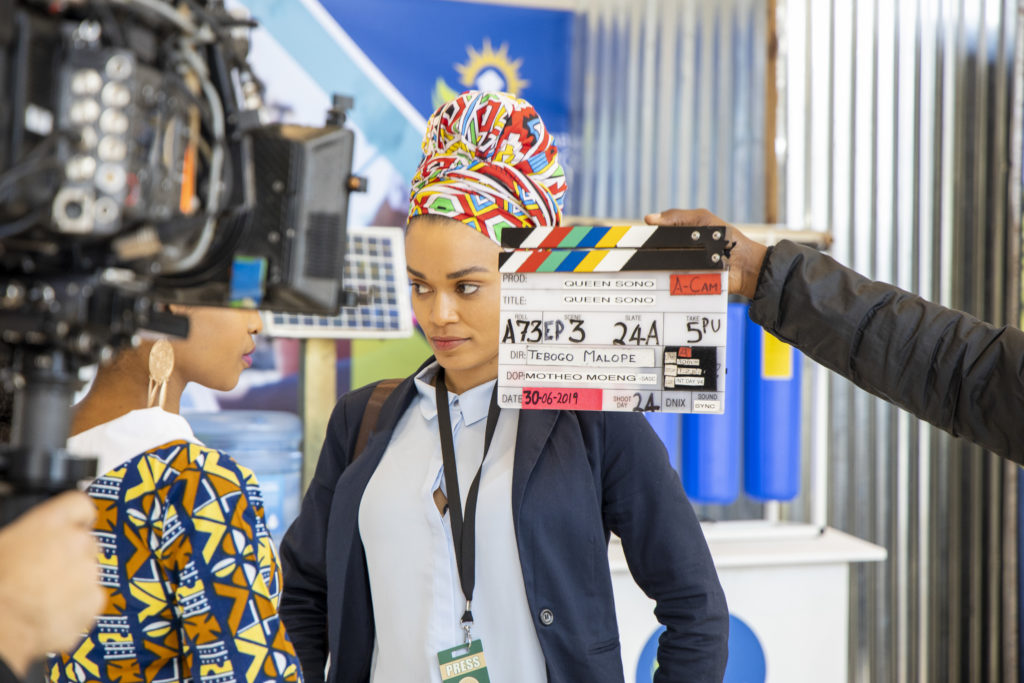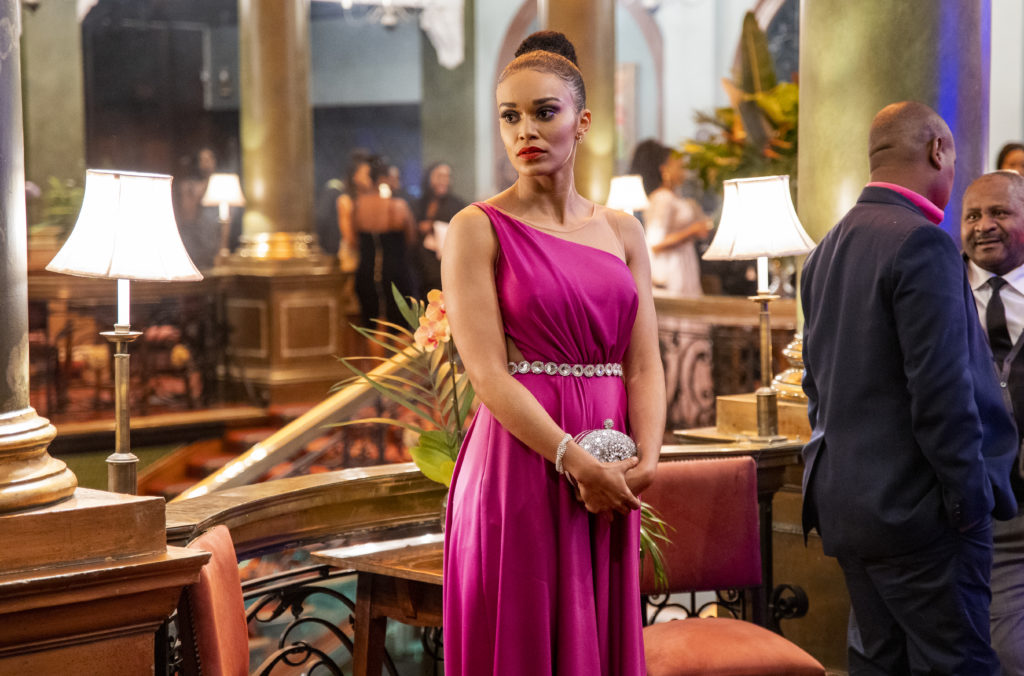Directed by Kagiso Lediga and Tebogo Malope in the first original African series commissioned by US streaming giant Netflix. (Netflix)
During its official release in local cinemas in 2018, Diprente’s Catching Feelings had the misfortune of running up against the phenomenon that director and producer Kagiso Lediga still refuses to acknowledge by name, referring to it simply as “Wakanda”.
A quieter “talkie [featuring] a suburban couple with weird sexual problems,” as Lediga puts it, Catching Feelings’s run coincided with the week in which Ster-Kinekor was pumping extra millions in marketing Black Panther “because they were also surprised, and they were making so much money that they were like, ‘Let’s throw more fuel to the fire’”.
When Catching Feelings landed on Netflix through a licencing deal, it did really well for Diprente, netting a global audience and setting the stage for the first original African series to be commissioned by the US streaming service.
The spy series Queen Sono, also stars Catching Feelings’s Pearl Thusi and came about after discussions between her and Lediga.
“She [Thusi] had made Scorpion King or something like that,” he says in jest, “which was a Universal Pictures straight-to-video type of thing. But she showed me this video of her fighting. It was unbelievable…”
Thusi mentioned how much she had enjoyed the experience and the physical stuff and how she would like to do more action.
Queen Sono, about a South African spy who is out to settle a score involving her mother’s unsolved political assassination, is a melding of Thusi’s penchant for action and Lediga’s devotion to the spy genre.
He and his business partner at Diprente, Tamsin Andersson, had long been developing a spy movie on the side; “a satire”.
“As satirists, with the spy genre you can weave in geopolitical stuff — it’s like a cool way to tell an African story,” says Lediga.
Although Diprente has an impressive portfolio that includes Catching Feelings, Late Night News with Loyiso Gola, Bantu Hour, Matwetwe and Almost News With Chester Missing, Queen Sono was, in many ways, unlike anything the company had done before.
https://www.instagram.com/p/B478i1zDXeG/?utm_source=ig_web_copy_link
For example, it had to be dubbed into 33 different languages and distributed across 196 countries.
“The machinery is huge and you feel that,” says Andersson. “It’s been quite collaborative; that process of making the content.”
She explains that usually local broadcasters have a mandate — what type of message they want to put out there.
“This has been much more of, ‘What do you guys want to put out? And let’s try to work collectively to sort of shape that,’” says Andersson.
“We didn’t want to do a preachy thing. We thought if this story continues and we get more seasons, we’ll get deeper and deeper into the history stuff and make it more central. We wanted to give them contemporary Africa for starters.”
Kagiso Lediga
“Their script to screen model is … yes, they are very involved and there’s a lot of notes, but there is kind of no point where they go: ‘We want this to appeal more to black audiences’. So they don’t have the same sort of left-over-from-apartheid distinctions that Souh African broadcasters index on a lot still.
“In fact they [Netflix] call it taste clusters, where they go, people who like this, this and this show, might also like this.”
This allowed the team the leeway to reverse engineer the primacy of race and South Africa’s political his..tory into the narrative
“Story aside, for me the image, especially for girls and women around the world, of this woman just moering dudes, I thought that would be a powerful idea,” says Lediga.
“And then we thought about the stuff that we like to talk about, which is the politics based on our history,” he says, adding that they then had to figure out how to merge the two.
“We didn’t want to do a preachy thing. We thought if this story continues and we get more seasons, we’ll get deeper and deeper into the history stuff and make it more central. We wanted to give them contemporary Africa for starters.”
And perhaps that is the common thread running through Diprente’s work for the past decade since the launch of Late Night News with Loyiso Gola; trying to find ways of presenting the continent in a refreshing way.
“PMS [Pure Monate Show] did it back in the day as well,” says Andersson, “putting forward a specific voice that wasn’t necessarily out there yet, saying that this is also cool. We can also talk about other things … in an era of soap operas that were just about weird aspirational shit that South Africans were supposed to want.”
“Even Queen Sono,” adds Lediga. “The idea that she’s a spy and she goes through a lot. She is fighting presidents and military men, she is literally fighting masculinity head on.”
 Undercover: Pearl Thusi, as the lead character Queen Sono. (Netflix)
Undercover: Pearl Thusi, as the lead character Queen Sono. (Netflix)
Although this is achieved through the projection of Queen Sono as a blaxploitation-type heroine in the mould of Foxy Brown, it is helped along by the way the men in the series take on roles usually reserved for women.
One such character is William, played by Khathu Ramabulana. As Queen’s long-suffering childhood friend and now a therapist, William gently supports her, putting up with her powerful personality.
Whereas some geopolitical themes are credible, others, such as the Gupta-esque Greek family with access to state coffers, come across as superficial subplots, especially considering audiences who will be unfamiliar with South African affairs.
Much of Queen Sono unfolds in Zimbabwe, Zanzibar, Congo and Kenya. While it does well with regards to its geographical spread, the intercontinental aspect doesn’t come through. For example Loyiso Madinga in the role of a foreign-national from a francophone country is suggestive of a reflex towards familiarity. With that said and done, the production’s high values are undeniable.
In conversation with the queen: Pearl Thusi
 Under cover: Kick-ass spy Queen Sono (Pearl Thusi) also has a glamorous side, as any agent worth her salt would. (Netflix)
Under cover: Kick-ass spy Queen Sono (Pearl Thusi) also has a glamorous side, as any agent worth her salt would. (Netflix)
On the position women occupy in the South African industry:
Coming on to a set that was led by women was rewarding. I knew all along that it would be that way. It was very exciting but I don’t think it’s surprising in South Africa. Think of the TV shows that we grew up watching. Yes we have aboSdumo and Georgie Zamdela in the drama series but women usually have pretty powerful roles. They are powerful in terms of the characters or being magnetic performers, even if the character doesn’t have much power. We have Brenda Ngxoli, Masasa Mpangeni, Zikhona Sodlaka and Terry Pheto.
It’s important that the rest of the continent and the rest of the world see how powerful African women are. I feel like we run shit. Look at Nomzamo (Mbatha), Minnie (Dlamini), Zinhle (Jiyane), me! We’re doing a lot. I think we need to start owning it.
The women in this show, Mam’ Abigail Kubeka as well, we basically drive the show. For once the men are there to help us colour the show.
On preparing for Queen Sono:
Without Scorpion King, I wonder if it would be happening for me the way that it is. Scorpion King is the first movie I did when I got back home from New York but it was also the movie that allowed me to explore my physical capabilities. It was what I used to show people what I’m capable of. Shout out to Don Michael Paul, the director, for believing in me and helping me build up and prepare for this type of moment. That was the role that made me realise I am a pretty strong girl.
I already do my own stuff. I go to body tech to accelerate the results but then there’s also boxing that I was already doing. I love doing yoga to stretch the muscles out. I do Sweat 1000. When I was getting ready for this, I had to learn a very intense fighting style. I don’t remember what the name is. Technique is the most important thing because as much as we apply the power, we don’t want to hurt the actors. It’s like learning a dance. It’s choreography.
When we’re training at the gym there are mats, we’re wearing comfortable clothes and shoes and everything is easy to learn. When you get to set it looks like this (a hotel room), we’re breaking sugar glass and then it’s slippery.
It’s a lot of work but it’s extremely rewarding.
On the directors Kagiso Lediga and Tebogo Malope:
Kagiso and Tebogo are so different. I’ve worked with Kagiso before. They have an extremely collaborative way of working. I really like that about them. But they’re so different. With Kagiso it will just be like: “Cut, that’s the spirit,” and we’ll carry on. Or he’ll be like: “Uhm, ja no. Let’s do it another way, that’s not a vibe.” His style is really casual and then with Tebogo, even though he’s got a playful nature, there’s a serious calm. Tebogo is a thinker who will remind you that he is a multi-award-winning director. Tebogo is definitely an actor’s director. I knew Tebogo existed but I didn’t know much about him. He allowed me to be insecure, he gave me time. They were both extremely delightful and worked well together.
Queen Sono will be released on Netflix on February 28.